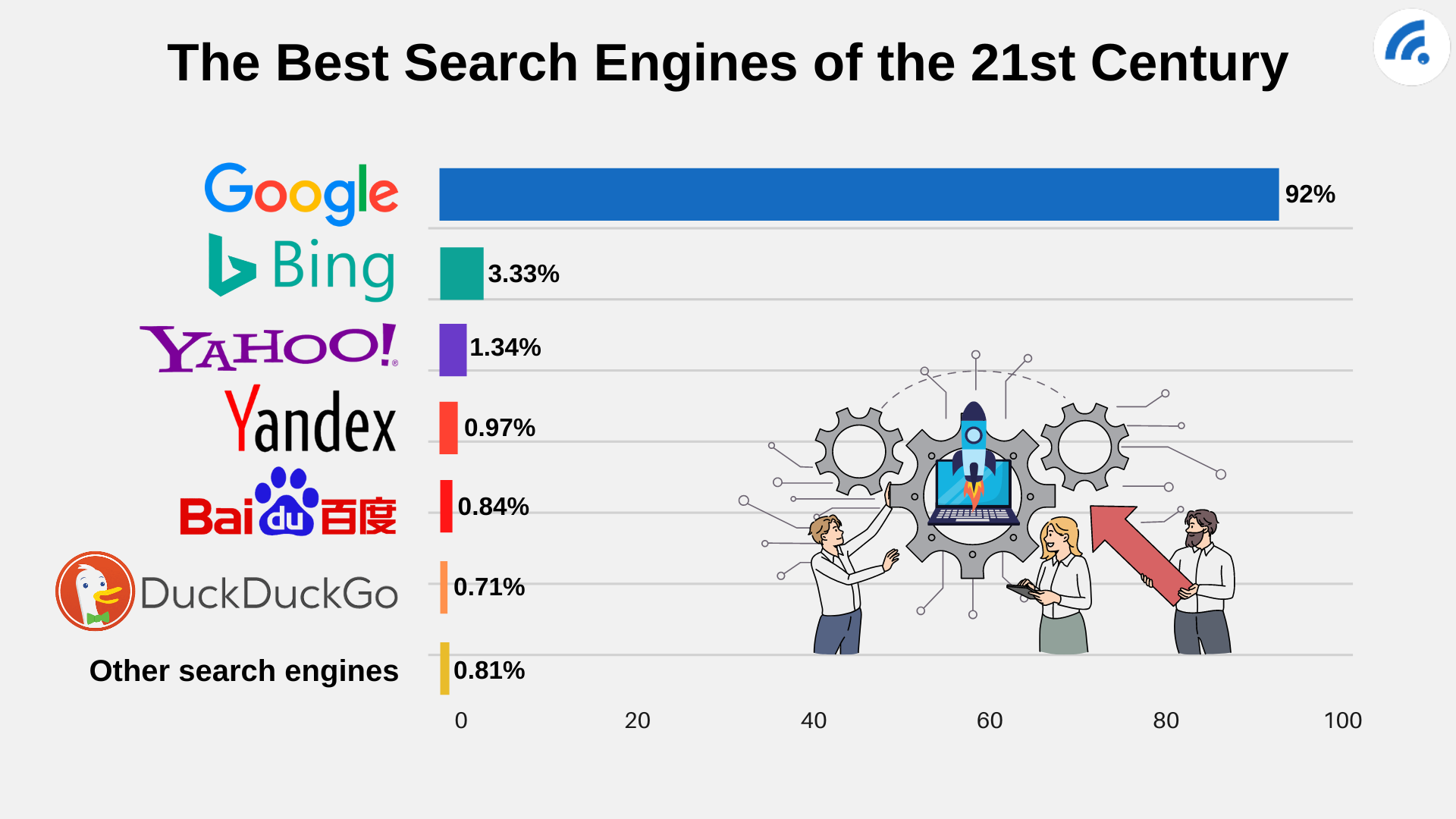With the phrase "Google it" now so entrenched in our everyday language, we tend to think searching Google is the same as searching the web. But Google is just a search engine, meaning it's a tool that displays information on the internet based on your specific query. In other words, it's a catalog of the internet.
Google was launched as a research project by founders Larry Page and Sergey Brin in 1996, and despite trying to sell the idea for less than a million dollars in 1999, it has grown to become the world's most preferred way to search the internet, and one of the most valuable companies in the world.
However you can use many other tools to search the internet, but how legitimate are these other tools? Does anyone even use them?
It turns out that despite Google's dominance of the market, there is still a good bit of search traffic out there that it doesn't own. That may change at some point, but it probably won't happen any time soon. But to give you an idea of what the search industry looks like, we've put together a list of the world's most popular search engines.
What is a Search Engine?
When you think about it, probably the majority of the time you spend online is spent looking things up online on search engines - usually Google. In fact, we do it so much that we’ve made it into a verb - googling - which has become a synonym for online searching, researching, or otherwise looking something up. But what is a search engine?
A search engine is essentially a catalog you can peruse to access different web pages. Mind you, it’s not the totality of the pages available online. There is a limit to what can be realistically crawled by one search engine. However, search engines like Google do a good job of ensuring they index as many pages as possible.
The First Search Engine
For many of us, the first search engines we ever used were Yahoo!, Magellan, Excite, and Northern Light, and for many more of us, Google is the only search engine we've ever known.
However, examples of search engines appeared alongside the first versions of the internet. Examples include "Who is" and the "Knowbot Information System," but these tools relied on indexing individual internet users and not content, meaning one had to manually load the content from their computer onto the search catalog for it to appear in search results.
However, the invention of the World Wide Web in 1993 made it possible for content to be loaded automatically, opening the door for the rapid rise of search engines throughout the 1990s.
Many of these original tools eventually fell out of relevance, but some have remained until the present day. Now, internet searching has become a major industry; US companies alone shelling out around $70 billion a year on trying to ensure their content ranks at the top of search engine results, a process known as Search Engine Optimization.
How Do Search Engines Work?
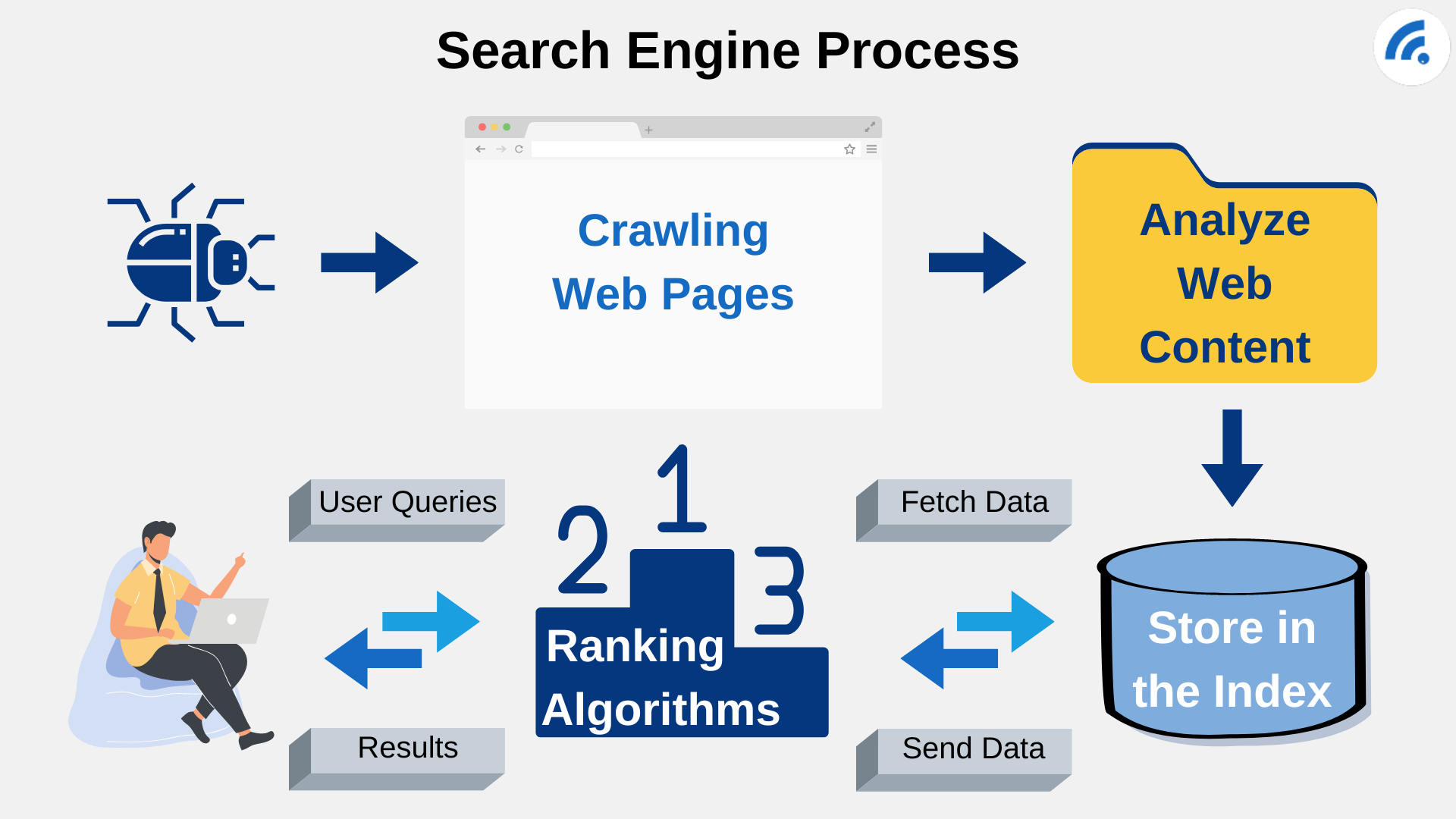
Perhaps most of us are at least vaguely aware of what search engines are - after all, we use them every day! - but the way they work is much more cloaked in mystery for the average user. How does a search engine pull relevant information from the internet to show you? How do search engines work, exactly?
Crawl
The first thing you need to be aware of is crawling, a process performed by search engines to view and download pages with the purpose of indexing it. This is done by web crawlers (which are typically spiders or bots). Crawlers identify links within these pages and follow them to discover new URLs to index.
Not just new pages are crawled; search engines also crawl pages that have already been indexed to check if there have been any changes in order to index the most recent and current version of the page. Some algorithms decide how often pages are indexed and which ones.
Search engine crawlers first download the robots.txt file from a given website. This file has information on sitemaps and pages that can and cannot be crawled.
Index
If crawling gathers information from all over the web, indexing is the process that organizes all this information neatly and in a way that’s easy to search and find. Every webpage and bit of information crawled is indexed for future reference.
Basically, when you perform a search in a search engine, that is the database you’re searching within. That’s why it’s essential for your website to get crawled and indexed by the biggest search engines - Google, Bing, and Yahoo - without that, users can’t find you.
Search
However, the discovery and subsequent crawling and indexing of all these web pages is not the entire process. The search engine also needs to decide how to rank the results when one completes a search. For that, a search algorithm is employed. A search algorithm is a formula that ranks the relevant results according to various factors.
Rank
When you look something up in a search engine, the results are ordered depending on their relevance to your search terms and perceived intent. The act of putting these results in order is known as ranking. The higher a website ranks, the more relevant it is to the search terms.
The Most Popular Search Engines
The first one is going to be obvious, but some of the names on the rest of this list of the most popular search engines in the world may surprise you.
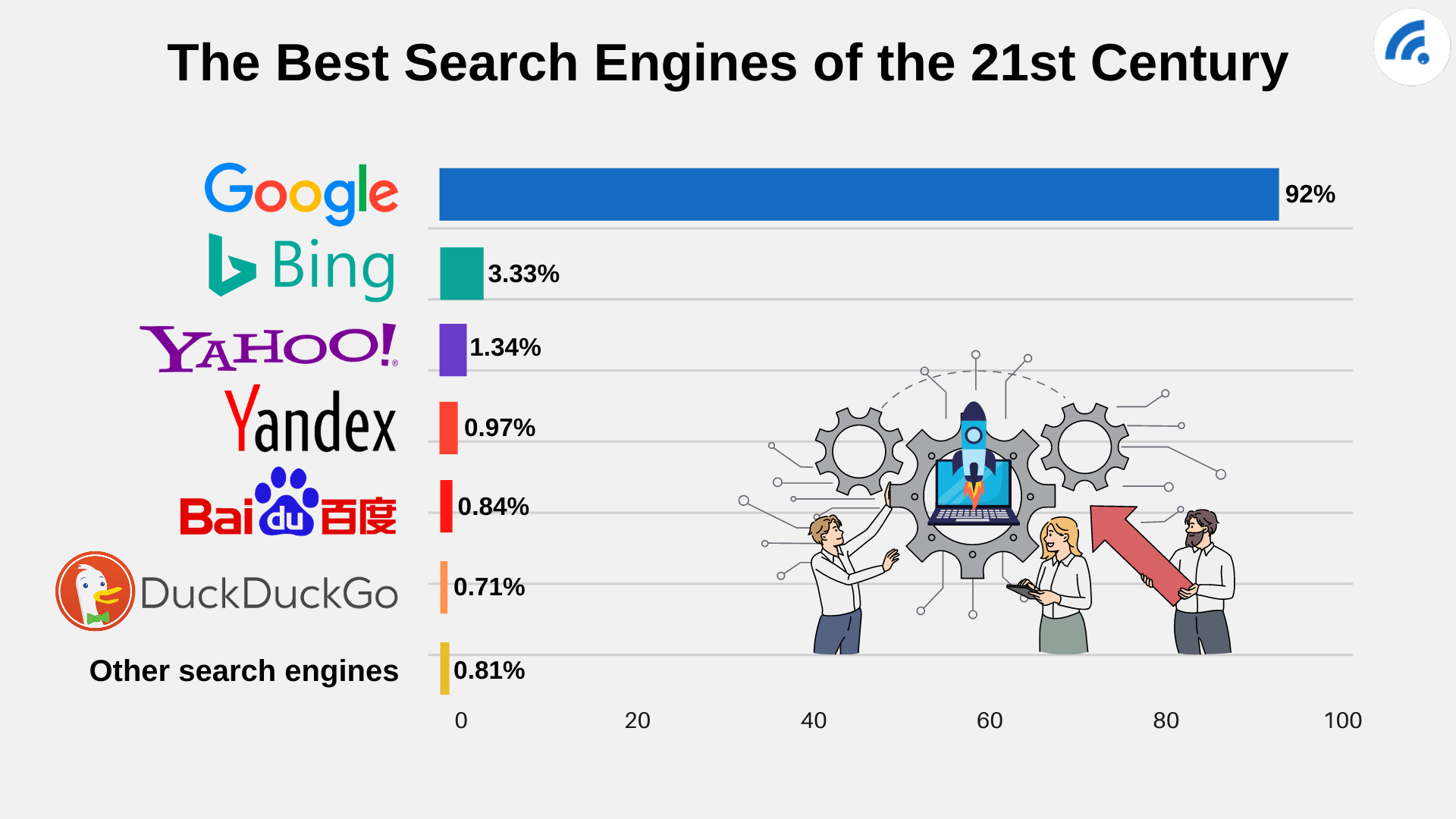
That Google is the most popular search engine in the world should surprise no one. However, it might surprise you to learn just how big and powerful Google is in the world of internet search. For example:
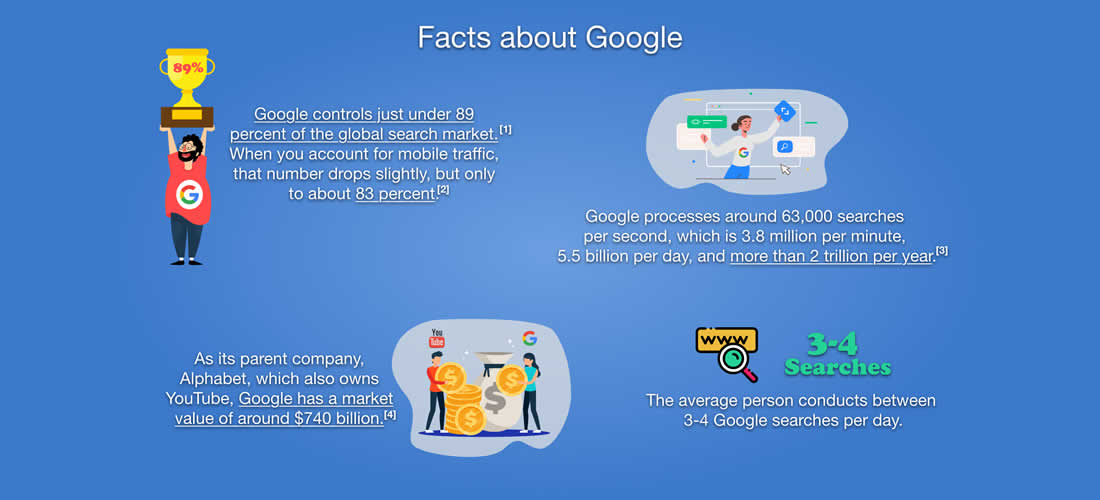
Part of the reason Google has been able to take such a stranglehold on the market is that it was one of the first search engines to begin selling search terms. Founders Larry Page and Sergey Brin recognized the value a detailed index of the internet could offer companies early on, and they began selling keyword-related ads in 2000. These are often the first results to appear at the top of a search results page which displays the word "Ad."
Google eventually expanded on this and now uses search history and a host of other user-supplied data to display targeted ads for its many partners. This practice provides the bulk of the company's revenue; in 2018, ad revenue generated around $116 billion for Google.
However, despite these impressive statistics about Google's dominance of the search market, Google has succeeded in expanding its presence in our lives by offering a wide range of other products upon which we depend, the most well-known being GMail, Google Docs, and the Android operating system.
These product lines are industry leaders in their own right, and they help show just how important Google has become in our lives today.
Things You Should Know
What makes Google such a popular and valuable product for users is the wide range of other products upon which we depend, the most well-known being GMail, Google Docs, and the Android operating system. These product lines are industry leaders in their own right, and they help show just how important Google has become in our lives today. That has been, perhaps, the most important factor in Google’s quick growth and industry domination.
By offering high-quality integrated services that meet a variety of needs, Google has successfully made itself present in every household and on every computer and has become almost irreplaceable. It is constantly at the forefront of innovation, not just for its search engine but for every other product, cloud storage or navigation software.
Bing
Google's top competitor is Bing, which is owned by Microsoft. However, with only about a 5 percent share of the search market, Bing is hardly a serious threat to Google's hegemony. It is the default search engine on Window's PCs (until you log in and change it to Google), but this tactic helps it remain relevant. However, a quick look at the stats shows that Bing is far behind in the race.
Currently, Bing receives around 1.3 million unique visitors per day, and only around 10 billion searches a month. To put this in context, Google performs the same amount of monthly Bing searches in just two or three days.
When you search on Bing, it looks almost the same as Google, even if it sometimes displays different results.
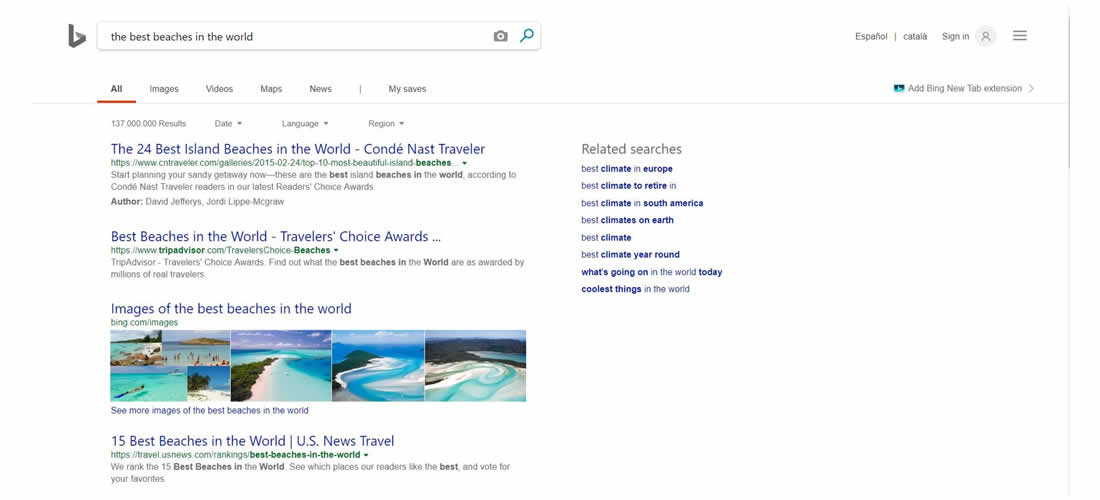
VERSUS
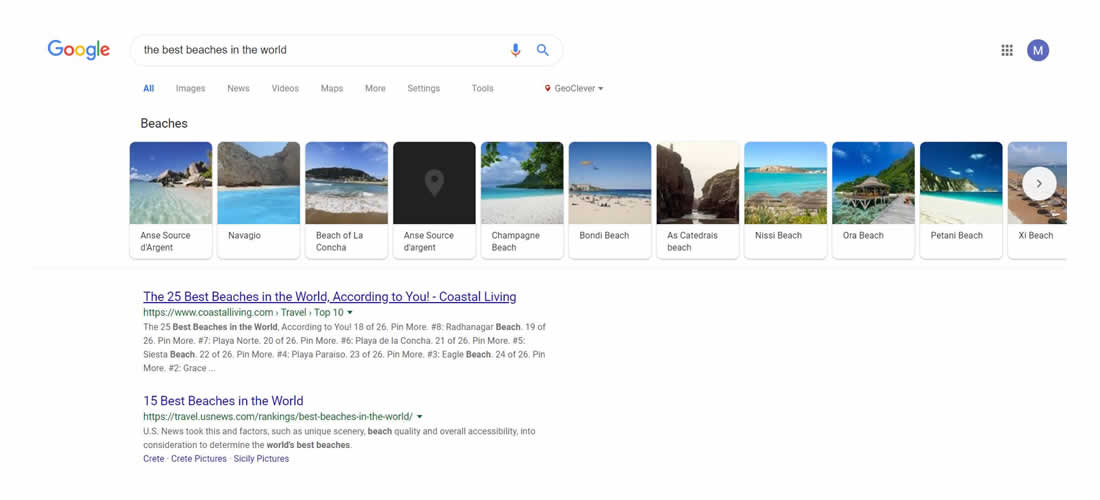
Close inspection reveals some more significant differences, but it's almost impossible to tell the difference between them at first glance. This may be part of the reason why Bing has struggled to claim more market share; it effectively does the same thing as Google, but the world is just so used to Google that it doesn't seem to want to change.
Bing does offer a rewards program through Microsoft that allows you to earn points for making purchases through searches, which can be redeemed for discounts and gift cards, but even this hasn't been able to lure people out of Google's grasp.
Things You Should Know
Perhaps surprisingly to some, Bing actually has a lot of high-quality features that even surpass some of its bigger competitors, including Google. Its image and video search capabilities are superior - including the ability to search for images in different layouts, which comes in handy when you need a specific format.
In addition, Bing also offers reward points for every search using its search engine, a novelty that isn’t exclusive to Bing, but isn’t offered by any other major player. Microsoft Rewards, as they’re called, can be used like gift cards in a variety of places, like Amazon or Starbucks.
Yahoo!
Yahoo! was Google's primary competitor in the early days, but things have changed quite a bit over the years. Currently, it holds less than a 4 percent share of the global search market, and Yahoo! Search is now run by Bing, meaning the search results you get from one are likely to be the same if not entirely similar as those you get from the other.
However, Yahoo offers other services such as email and fantasy sports and so it remains a relevant website in today's world. It currently ranks #9 on the Alexa ranking of the world's most popular websites.
Things You Should Know
Like Google and other similar products, Yahoo has invested in the creation of other products and avenues to strengthen its presence and hold on to the market. Yahoo Maps, Yahoo Dictionary, and Yahoo Mail are popular products, but the one it’s most known for is undoubtedly Yahoo News. By breaking into media, Yahoo has ensured that it remains relevant.
Yahoo also has a lot of things going for it that make it a worthy competitor to Google. Its user-friendly interface enables all users to navigate it easily, which is a big plus for those unfamiliar with tech, particularly older users. The search is effective, and there is fast access available to your favorite Yahoo services on your home page.
Amazon
Although Amazon is an eCommerce portal that allows you to buy pretty much anything and, nowadays, have it shipped to your home in as quickly as a day, it is the number one place people go to perform a product search. Google used to hold this spot, but the two companies switched places in 2018, making Amazon the top spot for online shopping-related searches. That someone was able to overtake Google in anything speaks to the influence Amazon has on today's digital world. Amazon also has a search engine - A9 - that completes its service package.
Things You Should Know
Sellers and buyers mainly use the Amazon search engine to look up similar products and make comparisons, and its most important and most appreciated feature, by far, is its simplicity. There are not many bells and whistles, but the algorithm works and is very reliable.
Speaking of the algorithm, it’s an extremely sophisticated and valuable feature for Amazon, able to connect buyers with as many relevant products as possible based on their keyword search.
On the flip side, Amazon is not the top search engine for the average search query if it’s not related to shopping - because that’s not its purpose.
Yandex.ru
Similar to Baidu in that it operates primarily in one country, Yandex.ru is one of the top search engines in the Russian Federation. In total, it takes care of about half the searches in Russia, and this gives it about 0.5 percent of the global market share.
However, like Baidu, it's difficult to see Yandex.ru branching out into other markets, although there are possibilities for it to grab a larger percentage of the Russian search market. Despite these limits on its growth, the position of Yandex.ru (which derives its name from "Yet Another Index") in the Russian market makes it an extremely valuable search tool.
It went public in 2011 and raised $1.3 billion, which was the largest public offering in the search engine space since Google went public in 2004, according to Reuters. Today, Yandex generates just under $2 billion in yearly revenue by selling ads much in the same way Google does in other parts of the world.
Things You Should Know
Russia is actually one of the few countries in the world where Google is not the top search engine. Yandex is not just the preferred search engine in the Russian market, it’s the top media outlet as well, with millions of Russians visiting the site every single day.
Like all top search engines, Yandex is also a source for music, maps, email, photos, videos, etc. It’s largely the same strategy Google used to expand its reach via integrated products. This is one of the reasons why Google does not have as strong a hold on the Russian market as it does in most other countries - the Yandex services are convenient and high-quality.
DuckDuckGo
Since launching in 2010, DuckDuckGo has seen considerable growth in the number of search queries performed on the site. In 2019, it has already handled more than 30 million search queries, which is double what it did in all of 2018.
Part of the reason DuckDuckGo is growing so quickly is that it places an emphasis on security. It does not profile people and caters to search results based on what they have queried in the past. This approach is designed to be a direct affront to Google's policies, which many feel infringes on personal privacy and give the company too much power.
This search engine will be interesting to watch in the years to come. Its rapid growth in the recent past reflects the general shift towards privacy on the internet, driven by people's desire to have more control over their personal data and what companies know about them. Only time will tell if this strategy allows the search engine to cut into the massive market share Google currently holds.
Things You Should Know
The main selling point of DuckDuckGo is its regard for its users' safety and privacy, but it also has other advantages. One of the other big ones is that its open source, so even if something is not up to snuff, any developer can submit their fixes and contribute to the smooth running of the product.
In addition, it offers alternatives to many of your favorite apps that may not be as private as you’d want them to be or aren’t serving your needs anymore. In the same privacy and security vein, there is a password generator for when you need a strong, reliable password to keep things safe.
AOL
Created in 1985, AOL (or America Online) was not just a simple search engine, it also provided internet services. It was one of the pioneers of the time, and everyone knew what AOL was. In fact, AOL was so heavily used that it was very much considered to represent “the internet” in the 90s, and its usage went up to 15 million people.
While it has lost its former glory and most of the millions of people who were using it have moved on, AOL is still around and relevant and one of the top search engines in history.
Things You Should Know
AOL has a market share of 0.06% and boasts many of the same features that have made Google and some of the other big names on the market incredibly successful. Images, local search, news, online shopping - all things you can do via AOL.
Other Search Engines Worth Considering
There are a handful of other search engines still out there, such as Ask (originally AskJeeves) and AOL Search, but these sites deal with such a small portion of global search volume that it's not really worth exploring them further.
Ecosia
Ecosia is doing things a little differently than others and deserves a mention for it. Ecosia utilizes advertising, but for a noble purpose - planting trees. Its environmentalist slant has yet to gain mondo-popularity, but it’s only a matter of time.
Pros and Cons
The most obvious advantage of Ecosia is the push for environmentalism. By using Ecosia, you can help plant trees. If you’re going to be exposed to advertising, you might as well make it for a good cause. The homepage actually gives a live counter of the number of trees planted with the help of their users.
The other pro weighing heavily in its favor is the fact that, like DuckDuckGo, they’re big believers in privacy. The search engine does not track internally, does not sell your data to third-party advertisers, and doesn’t hang on to your searches until the end of time. So if you’re going to look up something weird, do it on Ecosia.
Of course, it’s a comparatively small search engine without the tools, capabilities, and integrated products that some of the bigger names have. If seamless product integration is a concern for you, be aware of that.
Baidu
Despite not being wildly popular in the Western market, Baidu is actually in 4th place among the largest search engines in the world. It holds a market share of 0.84%, due largely to its immense popularity in China, where a whopping 86% of users access it regularly.
Pros and Cons
The main advantage of Baidu for the Chinese market is that it’s in Chinese, so in that respect, it’s going to automatically make it a better product and easier to use than Western alternatives, no matter how popular. Baidu has managed to capture a small percentage of the global search volume, but it is the go-to search tool in China, a country where the internet is restricted, and Google is often not even accessible. However, despite these limitations, Baidu is still the fourth most visited site in the world. This reminds us of one irrefutable truth: the Chinese market is enormous.
As a result, this means that while Baidu is a small player in the world of global search, it is a critical component of any search-related marketing strategy targeting the Chinese market.
However, outside of China, Baidu is significantly less relevant. Currently, it only displays results in Chinese, making it difficult to see a scenario in which Baidu can carve out market share in other parts of the world, especially considering the dominance of Google.
YouTube
To further demonstrate the extent of Google's dominance, consider that the world's second most popular search engine is YouTube, which is owned by Alphabet, the same company that owns Google. However, despite generating tons of search traffic, the two are quite different, with YouTube specializing in displaying user-uploaded video content.
According to the Alexa ranking, YouTube is the second most popular website in the world, behind only Google. Currently, around 1.3 billion people use YouTube monthly to watch some 5 billion videos daily. Exact search figures are difficult to ascertain, but we expect them to be close to the number of videos watched, which puts YouTube search traffic not that far off from that of Google. Pretty incredible, considering all it does is display videos.
Because of all this activity, YouTube search traffic is extremely valuable. It provides considerable insight into user preferences and interests, which makes it a great place to showcase targeted ads, the company's primary source of revenue. YouTube generates over $13 billion a year in ad revenue for its parent company, Alphabet.
However, whether or not YouTube is actually a search engine is somewhat up for debate as some argue it is more a social media platform than a search engine. But it's difficult to overlook YouTube when compiling a list of the most popular search engines.
Launched as a website where people could connect with friends and find out what they were up to, Facebook is now much more, becoming increasingly relevant as a search tool. In fact, in 2018, it surpassed Bing in total number of daily searches. However, since Bing and Facebook do different things, we can't say that Facebook has a larger global search volume share than Bing. It's interesting to see people using Facebook more and more for searching, and we can certainly speculate whether they will use it in the future to grow Facebook's reach and bottom line.
Conclusion
How many things did you google today? We all do it every single day. Statistics say over 90% of us do it on Google - the most popular search engine by far - but many other search engines are vying for a top spot in people’s preferences. They all have their own advantages and disadvantages and special features.
Integrated products such as email, image search, or maps are big crowd pleasers and one of the major reasons why Google managed to overtake the market so quickly. However, newer, smaller search engines offer unique benefits, such as a heavy emphasis on privacy and security or even environmentalism.

